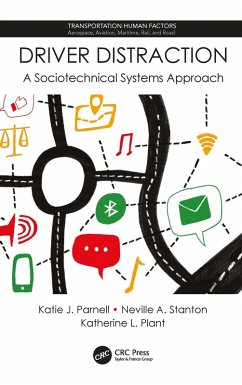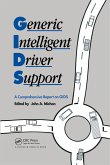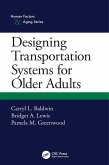Katie J. Parnell, Neville A. Stanton, Katherine L. Plant
Driver Distraction (eBook, ePUB)
A Sociotechnical Systems Approach
173,95 €
173,95 €
inkl. MwSt.
Sofort per Download lieferbar

87 °P sammeln
173,95 €
Als Download kaufen

173,95 €
inkl. MwSt.
Sofort per Download lieferbar

87 °P sammeln
Jetzt verschenken
Alle Infos zum eBook verschenken
173,95 €
inkl. MwSt.
Sofort per Download lieferbar
Alle Infos zum eBook verschenken

87 °P sammeln
Katie J. Parnell, Neville A. Stanton, Katherine L. Plant
Driver Distraction (eBook, ePUB)
A Sociotechnical Systems Approach
- Format: ePub
- Merkliste
- Auf die Merkliste
- Bewerten Bewerten
- Teilen
- Produkt teilen
- Produkterinnerung
- Produkterinnerung

Bitte loggen Sie sich zunächst in Ihr Kundenkonto ein oder registrieren Sie sich bei
bücher.de, um das eBook-Abo tolino select nutzen zu können.
Hier können Sie sich einloggen
Hier können Sie sich einloggen
Sie sind bereits eingeloggt. Klicken Sie auf 2. tolino select Abo, um fortzufahren.

Bitte loggen Sie sich zunächst in Ihr Kundenkonto ein oder registrieren Sie sich bei bücher.de, um das eBook-Abo tolino select nutzen zu können.
Application of a sociotechnical systems approach to the road safety domain is lagging behind other safety domains. Benefits in reviewing driver error have begun to be recognized, but not yet transcended into countermeasures. This book covers the role that the sociotechnical system plays in the study, theory, and mitigation of driver distraction.
- Geräte: eReader
- mit Kopierschutz
- eBook Hilfe
- Größe: 10.35MB
Andere Kunden interessierten sich auch für
![Driver Distraction (eBook, ePUB) Driver Distraction (eBook, ePUB)]() Driver Distraction (eBook, ePUB)165,95 €
Driver Distraction (eBook, ePUB)165,95 €![Generic Intelligent Driver Support (eBook, ePUB) Generic Intelligent Driver Support (eBook, ePUB)]() Generic Intelligent Driver Support (eBook, ePUB)45,95 €
Generic Intelligent Driver Support (eBook, ePUB)45,95 €![Behavioural Adaptation and Road Safety (eBook, ePUB) Behavioural Adaptation and Road Safety (eBook, ePUB)]() Behavioural Adaptation and Road Safety (eBook, ePUB)150,95 €
Behavioural Adaptation and Road Safety (eBook, ePUB)150,95 €![Designing Transportation Systems for Older Adults (eBook, ePUB) Designing Transportation Systems for Older Adults (eBook, ePUB)]() Carryl L. BaldwinDesigning Transportation Systems for Older Adults (eBook, ePUB)64,95 €
Carryl L. BaldwinDesigning Transportation Systems for Older Adults (eBook, ePUB)64,95 €![Human Factors of Visual and Cognitive Performance in Driving (eBook, ePUB) Human Factors of Visual and Cognitive Performance in Driving (eBook, ePUB)]() Candida CastroHuman Factors of Visual and Cognitive Performance in Driving (eBook, ePUB)68,95 €
Candida CastroHuman Factors of Visual and Cognitive Performance in Driving (eBook, ePUB)68,95 €![Handbook of Teen and Novice Drivers (eBook, ePUB) Handbook of Teen and Novice Drivers (eBook, ePUB)]() Handbook of Teen and Novice Drivers (eBook, ePUB)75,95 €
Handbook of Teen and Novice Drivers (eBook, ePUB)75,95 €![Handbook of Driving Simulation for Engineering, Medicine, and Psychology (eBook, ePUB) Handbook of Driving Simulation for Engineering, Medicine, and Psychology (eBook, ePUB)]() Handbook of Driving Simulation for Engineering, Medicine, and Psychology (eBook, ePUB)80,95 €
Handbook of Driving Simulation for Engineering, Medicine, and Psychology (eBook, ePUB)80,95 €-
-
-
Application of a sociotechnical systems approach to the road safety domain is lagging behind other safety domains. Benefits in reviewing driver error have begun to be recognized, but not yet transcended into countermeasures. This book covers the role that the sociotechnical system plays in the study, theory, and mitigation of driver distraction.
Dieser Download kann aus rechtlichen Gründen nur mit Rechnungsadresse in A, B, BG, CY, CZ, D, DK, EW, E, FIN, F, GR, HR, H, IRL, I, LT, L, LR, M, NL, PL, P, R, S, SLO, SK ausgeliefert werden.
Produktdetails
- Produktdetails
- Verlag: Taylor & Francis eBooks
- Seitenzahl: 270
- Erscheinungstermin: 14. November 2018
- Englisch
- ISBN-13: 9780429882722
- Artikelnr.: 54675138
- Verlag: Taylor & Francis eBooks
- Seitenzahl: 270
- Erscheinungstermin: 14. November 2018
- Englisch
- ISBN-13: 9780429882722
- Artikelnr.: 54675138
- Herstellerkennzeichnung Die Herstellerinformationen sind derzeit nicht verfügbar.
Dr. Katie J. Parnell studied for her Engineering Doctorate at the University of Southampton and holds a First class BsC Psychology degree from the University of Reading. Her research interests include applying, developing and reviewing accident causation from a sociotechnical systems viewpoint. Katie is also interested in the advancements in technological interfaces and how they can be utilised safely. She has published a number of journal articles on applying the sociotechnical systems approach to the study, and mitigation of, driver distraction.
Professor Neville A. Stanton, PhD, is a Chartered Psychologist, Chartered Engineer and a Chartered Ergonomist, and holds the Chair in Human Factors in the Faculty of Engineering and the Environment at the University of Southampton. He has degrees in Psychology, Applied Psychology and Human Factors and has worked at the Universities of Aston, Brunel, Cornell and MIT. His research interests include modelling, predicting and analysing human performance in transport systems as well as designing the interfaces between humans and technology. Professor Stanton has worked on cockpit design in automobiles and aircraft over the past 25 years, working on a variety of automation projects. He has published 40 books and over 300 journal papers on Ergonomics and Human Factors, and is currently an editor of the peer-reviewed journal Ergonomics. In 1998 he was awarded the Institution of Electrical Engineers Divisional Premium Award for a co-authored paper on Engineering Psychology and System Safety. The Institution of Ergonomics and Human Factors awarded him The Otto Edholm Medal in 2001, The President¹s Medal in 2008 and The Sir Frederic Bartlett Medal in 2012 for his contribution to basic and applied ergonomics research. The Royal Aeronautical Society awarded him and his colleagues the Hodgson Prize and Bronze Medal in 2006 for research on design-induced flight-deck error published in The Aeronautical Journal. The University of Southampton has awarded him a Doctor of Science (DSc) in 2014 for his sustained contribution to the development and validation of Human Factors methods.
Dr Katherine L. Plant, BSc, PhD, is New Frontiers Fellow in Human Factors Engineering in the Transportation Research Group (TRG) within the Faculty of Engineering and the Environment at the University of Southampton, UK. She is the technical lead for aviation and road safety research within the group. In 2014 Katie was awarded the Honorable Company of Air Pilots Prize for Aviation Safety for her research exploring aeronautical critical decision making. Her primary research interests center on understanding how the interaction of the environment we work in and the mental schema that we hold influence our actions and decision-making processes. Katie is passionate about teaching Human Factors and runs the module 'Human Factors in Engineering', which is offered to undergraduate and MSc Engineering students across the faculty. In addition to this, Katie supervises a number of PhD, MSc and undergraduate student projects.
Professor Neville A. Stanton, PhD, is a Chartered Psychologist, Chartered Engineer and a Chartered Ergonomist, and holds the Chair in Human Factors in the Faculty of Engineering and the Environment at the University of Southampton. He has degrees in Psychology, Applied Psychology and Human Factors and has worked at the Universities of Aston, Brunel, Cornell and MIT. His research interests include modelling, predicting and analysing human performance in transport systems as well as designing the interfaces between humans and technology. Professor Stanton has worked on cockpit design in automobiles and aircraft over the past 25 years, working on a variety of automation projects. He has published 40 books and over 300 journal papers on Ergonomics and Human Factors, and is currently an editor of the peer-reviewed journal Ergonomics. In 1998 he was awarded the Institution of Electrical Engineers Divisional Premium Award for a co-authored paper on Engineering Psychology and System Safety. The Institution of Ergonomics and Human Factors awarded him The Otto Edholm Medal in 2001, The President¹s Medal in 2008 and The Sir Frederic Bartlett Medal in 2012 for his contribution to basic and applied ergonomics research. The Royal Aeronautical Society awarded him and his colleagues the Hodgson Prize and Bronze Medal in 2006 for research on design-induced flight-deck error published in The Aeronautical Journal. The University of Southampton has awarded him a Doctor of Science (DSc) in 2014 for his sustained contribution to the development and validation of Human Factors methods.
Dr Katherine L. Plant, BSc, PhD, is New Frontiers Fellow in Human Factors Engineering in the Transportation Research Group (TRG) within the Faculty of Engineering and the Environment at the University of Southampton, UK. She is the technical lead for aviation and road safety research within the group. In 2014 Katie was awarded the Honorable Company of Air Pilots Prize for Aviation Safety for her research exploring aeronautical critical decision making. Her primary research interests center on understanding how the interaction of the environment we work in and the mental schema that we hold influence our actions and decision-making processes. Katie is passionate about teaching Human Factors and runs the module 'Human Factors in Engineering', which is offered to undergraduate and MSc Engineering students across the faculty. In addition to this, Katie supervises a number of PhD, MSc and undergraduate student projects.







